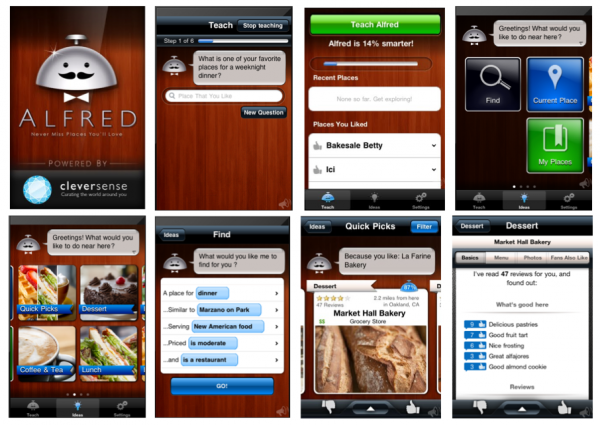Clever Sense: A Mobile Search Engine That’s Like “Pandora For The Real World”
I suspect someone is going to successfully build Google’s “contextual discovery engine” before Google does. The newest company to make a run at what Marissa Mayer was talking about is Clever Sense with its new app “Alfred” (formerly called Seymour). Intended to be a demonstration of Clever Sense’s underlying data extraction and machine learning technologies, […]

Intended to be a demonstration of Clever Sense’s underlying data extraction and machine learning technologies, Alfred creates a personalized “interest graph” that then serves up local recommendations for places you’ll like. But you can also search in a more conventional way.
Of course Clever Sense isn’t the first company to create a “recommendation engine” or local “discovery engine.” Currently Where and Bizzy position themselves in this way. (Where was acquired by eBay and may ultimately turn into something very different however.)
Google is also trying to use social signals to offer local recommendations in mobile.
Clever Sense’s Alfred uses a mixture of Q&A “teaching,” social signals and other techniques to construct your interest graph. I found the teaching part to be less tedious and onerous than on comparable apps. And relatively quickly it was making some pretty solid recommendations.
Clever Sense describes how the app works:
The Extraction Engine built into the Clever Sense Platform curates large amounts of unstructured crawled data by leveraging natural language processing, statistical machine learning, and data mining algorithms.
As it reads through the data, the Extraction Engine learns meaningful concepts that are descriptive of physical items in the real world. These concepts constitute the foundation of the Clever Sense Interest Graph. The engine further leverages social interactions like check-ins, likes, and ratings to enrich the Interest Graph. It calculates similarities via graph-based algorithms using these social interactions.
I spoke with CEO Babak Pahlavan several weeks ago. He gave me a demo and described Clever Sense’s “interest graph” as “Pandora for the real world.” In other words Clever Sense assigns or maps physical places to one another based on styles, characteristics and attributes in the same way that Pandora does for music. However Clever Sense is not using humans to tag or otherwise “curate” data. It’s all done by machine.
Pahlavan also explained that the interest graph is comprehensive, so the app will enable users to visit an entirely new city and get instant recommendations that are similar to places they like at home. That’s a pretty compelling use case I think.
[youtube]https://www.youtube.com/watch?v=Z-h5Rze5uGc[/youtube]
Opinions expressed in this article are those of the guest author and not necessarily Search Engine Land. Staff authors are listed here.
Related stories
New on Search Engine Land
